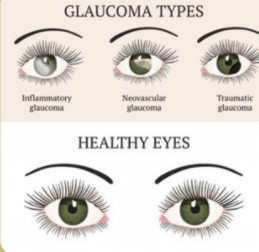Experts warn that sleep can affect eye pressure, optic nerve blood flow, and glaucoma progression.
Though sleep is an essential part of everyday life and is generally a time for healing, there are changes to the body’s physiology and positioning that can have a negative effect on glaucoma and eye pressure, according to Associate Professor of Ophthalmology, Dr. Kathryn Bollinger.
Intraocular pressure during sleep
Writing for Glaucoma Research Foundation, Dr. Bollinger notes that eye pressure is affected by the rate of aqueous fluid production and drainage. Although aqueous fluid production decreases during sleep, intraocular pressure actually increases due to blocking of the drainage system when lying flat. Overall, eye pressure increases 10-20% when both effects are taken into account.
Blood flow to the optic nerve during sleep
Blood pressure generally decreases during sleep and stays low throughout the night. This long duration of relative hypotension has been linked to worsening of glaucoma. However, lower night-time blood pressure in some hypertensive patients may decrease certain cardiovascular risks.
In patients whose glaucoma is worsening despite what appears to be good eye pressure control, either the patient or the ophthalmologist should have a discussion with the primary care doctor or internist to see if decreasing nighttime blood pressure medicines could be safely undertaken.
Sleep Apnea
Another process that can occur during sleep and could negatively affect glaucoma is sleep apnea.
Some individuals, especially those who are overweight or who snore heavily, may be prone to episodes of partial or complete cessation of breathing that happen during sleep. The patient may be totally unaware of these episodes, but the sleeping partner may notice the choking or gasping sounds.
During these periods of reduced or absent breathing, there is a reduction in the oxygen going to the optic nerve, causing further damage in glaucoma patients.
Also, these nighttime episodes may be accompanied by daytime fatigue and sleepiness. Patients with sleep apnea have a greater likelihood of having glaucoma and, although not common, patients with glaucoma are more likely than the general population to have sleep apnea. Because sleep apnea can cause worsening of glaucoma, it is particularly important to recognize its presence and to appropriately treat it.
In any of the above conditions, close collaboration between the eye doctor and the primary care doctor can be both a vision saver and a life saver.
Benefits of adequate sleep
Finally, too little or too much sleep has been linked to worsening visual field defects in glaucoma patients and a higher rate of glaucoma.
The ideal amount of sleep is different for each individual but varies from five to nine hours. In addition, adequate sleep has also been shown to benefit patients with conditions such as Alzheimer’s disease, heart disease, kidney disease, high blood pressure, diabetes, stroke, and obesity — conditions which may also be present in glaucoma patients.


